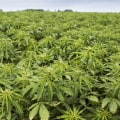Hemp is a type of “liberated fiber”, meaning that it is one of many natural fibers derived from the stems of plants such as flax, jute and nettle. It has been cultivated for thousands of years and on almost every continent, and requires a relatively small amount of land to grow. According to the Sustainable Textiles Guide, this means that it can produce up to twice the fiber yield per hectare as cotton. Not only is hemp environmentally friendly, but it also requires very little water, especially compared to cotton, which, according to Slate, uses “approximately 50 percent more water per season than hemp”.
However, many companies now produce hemp fabrics chemically, in a process that is much more environmentally intensive, but faster and cheaper to create. On the other side of the pond, the legalization of industrial hemp last December is allowing American farmers to collect government subsidies to grow the crop. Paul Dillinger, director of innovation at Levi's, spoke about the brand's plans to improve the quality of its cotton hemp so that, in the future, its hemp garments look like cotton. Hemp is a great ecological resource for the future, not only for fabrics but also for uses of paper and toilet paper.
It can also be mixed with other natural fibers to create fabrics with the durability of hemp and the softness of cotton or bamboo. Not that there's anything wrong with wearing unwashed hippie clothes if you happen to be an unwashed hippie, but the trend certainly hasn't done much to improve the image of hemp among the general population. The benefits of hemp are clear: it requires less water than cotton and can produce up to twice as much fiber yield per hectare. It is also a great ecological resource for paper and toilet paper production.
Furthermore, its compound annual growth rate is expected to increase by 14% during that time, driven largely by the nutritional and cosmetic qualities of hemp. Hemp's nickname “cousin of marijuana” often distracts attention from the fabric's many beneficial uses. However, with more companies producing hemp fabrics chemically in a process that is much more environmentally intensive but faster and cheaper to create, it is important to be aware of how our clothing choices can impact our environment. By choosing hemp over cotton when possible, we can help reduce our environmental footprint and make a positive impact on our planet.







